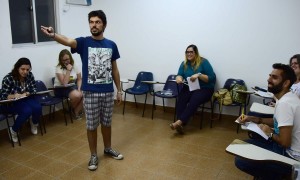run short, run short of
这两个短语都是“快用完”的意思。前者相当于不及物动词,主语一般为物,以主动形式表示被动意义; 后者相当于及物动词,其主语为人或部门, of后接表示时间或钱、物的名词。例如:
The flour is running short.
面粉快用完了。
We have run short of flour.
我们的面粉快用完了。
run away, escape, flee, fly
这组词(组)都有“跑开”“逃跑”“逃亡”的意思。它们的区别在于:escape多表示逃跑后的结果(如未被捕获,并不指逃跑的动作); flee表示逃跑的行为本身,常含有“惧怕”的意味。例如:
Many people fled the burning hotel.许多人逃离了着火的旅馆。
There was evidence that the burglars had been frightened and had fled.有证据说窃贼是受惊之后仓皇逃走的。
fly强调“逃跑”的仓促性,通常带有紧急意味。例如:
Why did the sportsman fly his country?为什么那个运动员叛逃到国外去呢?
run away多用于口语,指不让人知道,有时含有“不辞而别”的意味。例如:
He ran away twice from his boarding school.他两次从寄宿学校出走。
run into, add up to, amount to, come to, count up to
这五个短语动词都是“总计”的意思,其差别很细微:
1.从构成上说, add up to和count up to是动副介型短语; 而amount to, come to和run into是动介型短语。
2.从主语上说, add up to和come to相同,均多为钱、账单、数目等; amount to和run into的主语多为loss, cost, expense, debt, sum等名词; 而count up to的主语则仅限It。例如:
Our hotel bill added up to〔amounted to,came to〕 300 dollars.我们的旅馆费共计300美元。
His debts amounted to〔ran into〕 over 3000 dollars.他的债务已高达3000多美元。
It counts up to 300 dollars.共计300美元。
3.从宾语上说, add up to, amount to, come to后一般接数字; 而count up to和run into后除可接数字外,还可接名词。例如:
It counts up to a considerable sum.合计起来数目相当可观。
Losses run into six figures.损失高达6位数。
4.从使用场合上说, come to最通俗, count up to不常用。
run, flow, pour, stream
这组词共同的意思是“流”“流动”。它们的区别是:
1.flow, run, stream和pour都可指液体流动; flow还可指气体流动; pour还可指光线、微粒等倾泻。
2.时间上:flow一般指源源不断地、长时间地流动; run既可以是源源不断地、长时间地流动,也可以是流动一段时间; stream和pour多指短时间地流动。
3.方向上:指液体流动时, flow是水平流动; run和stream既可水平流动,也可垂直流动; pour是垂直流动。
4.流速上:从快到慢依次为pour, stream, run, flow。具体说就是flow是平平稳稳地流动; run比较湍急; stream比run更有力; pour则是“倾泻”。
5.flow, stream和pour常用于比喻, run很少用于比喻。例如:
The river was flowing quietly.河水静静流着。
She let her hair down so that it flew darkly over her shoulders.她让乌黑的头发披散下来,飘垂到肩上。
The river runs through hills and fields.河水流经山冈和田野。
The water runs out of the pipe into the bucket.水自管内注入水桶中。
Tears were streaming down her face.她脸上热泪滚滚而下。
The students streamed into the auditorium.学生们络绎不绝地进入礼堂。
run, gallop, race
这组词的意思都是“跑”。它们的区别是:
race指与他人比较走得快慢,强调速度上的比赛; gallop多指马全速奔跑,也可指人飞快地跑; run指以一定的速度跑。例如:
I'll race you to the end of the road.我和你比赛,看谁先跑到这路的尽头。
Don't bother galloping after the bus, you'll never catch it.别费劲去追赶那辆公共汽车了,你怎么也赶不上的。
I used to run when I was in middle school.我在中学的时候常常跑步。
run, manage, operate
三者都表示“经营”“管理”。它们的区别是:
1.operate含所有人与代理人共同经营的意思。
2.manage指对经营的工厂、商店等全面的监督,包括处理问题和日常事务,但不一定拥有所有权。例如:
She managed the shop while the owner was away.店主出门去的时候,她照管商店。
She manages the money very well.她理财有方。
3.run指使经营管理的工厂、企业等运转起来,多为自筹资金,拥有所有权。例如:
Mr. Smith runs a grocery shop.史密斯先生经营一家杂货店。
They ran the nurseries extremely well.他们把托儿所办得很好。
下面两句意思相同:
Her face was running down with tears.
Tears were running down her face.
她泪流满面。
下面各组中的两个句子意思不同:
The policeman is running after him.
警察正在追赶他。
The policeman is running behind him.
警察在他后面跑。
She ran to me with a knife.
她拿着一把刀子向我跑来。
She ran at me with a knife.
她拿着一把刀子向我袭来。
The farmer ran up a house.
那农夫爬上房。
The farmer ran a house up.
那个农夫匆匆建起一栋房子。
The poor woman ran home.
那可怜的女人跑回家。
The poor woman ran a home.
那个可怜的女人照管一个家。
run,jog,race,trot
这些动词均有“跑”之意。
run最普通用词,指由于各种原因而急速奔跑。
jog指从容不迫地慢跑。
race多用于赛跑,指以最快速度奔跑。
trot强调小跑时上下弹跳的动作,是介于跑与走之间轻快的快速运动。










